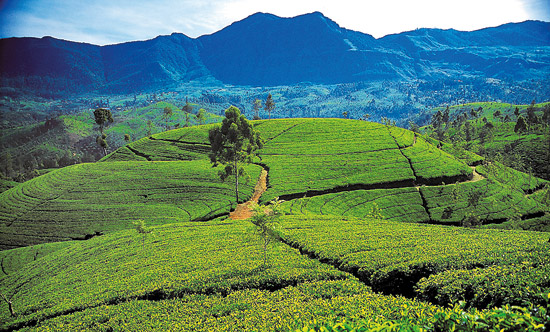Impact of RPCs on Sri Lanka’s economy and environment
The plantation industry has long been a cornerstone of Sri Lanka’s economy, and synonymous with the highest quality premium exports. Despite facing significant challenges over the past four years, including COVID-19, arbitrary decisions on fertilisers and agro-chemicals, and a historic economic crises, the industry provided a rare pillar of stability.
However, since independence, the plantation sector has been stifled by short-sighted policies. These range from the initial decision to nationalise plantations to recent wage issues, failure to implement productivity-linked wages and prevent politically motivated land encroachments. Additionally, bans on agri-chemicals, fertilisers, and oil palm cultivation have been disconnected from the industry’s interests, driven instead by election cycles.

Tea estates
The turmoil caused by these policies underscores the need for a stable and sustainable management approach for the plantation sector. Stakeholders must objectively evaluate the industry and adopt successful local and global strategies to ensure its survival in an increasingly volatile global economy.
Reviewing the failure of
state-managed plantations
Before privatisation in 1992, the plantation industry in Sri Lanka was consolidated under state-owned Janatha Estates Development Board (JEDB) and Sri Lanka State Plantations Corporation (SLSPC). Political interference plagued these entities, leading to inefficiencies, financial losses, and declining productivity.
Had privatisation not gone ahead, and assuming that losses remained constant, taxpayers would have been forced to pay billions of rupees between 1992 to the present day. This sum does not factor in the radical increase in plantation sector wages between the end of the state-managed era and the present day under privatised management.
In addition to freeing the Government and the taxpayer of this significant financial burden, Regional Plantation Companies (RPCs) also invested significant capital towards development of the industry from field to factory including Rs. 70 billion towards replanting, infrastructure development, factory development and other essential capital inputs. During the same period, they paid Rs. 6.7 billion in lease rentals and Rs. 1.7 billion in income taxes, further underscoring their role as key economic contributors.
Reaping the benefits of
RPC management
The privatisation of the plantation sector marked a significant turning point, transferring management to RPCs. This shift enhanced operational efficiencies, productivity, and reduced the financial burden on the Government. In the three decades since, RPCs have succeeded in these objectives despite continuous obstacles.
Investments in diversifications
During the 1995/96 period, shareholders made significant investments based on opportunities highlighted in the bid documents. These opportunities included setting up hydro-power projects, forestry, agricultural diversification, and giving total autonomy on land utilisation. RPCs quickly recognised the need for diversification. They focused on cultivating oil palm in suitable areas and have since led the charge in crop diversification. Today, a significant hectarage of RPC land is dedicated to diverse crops. These include innovative crops like arecanut, macadamia, pineapple, rambutan, soursop, lemon, oranges, papaya, avocado, passion fruit, pears, and vanilla, along with spices like pepper, cloves, and cardamom.
Additionally, RPCs have spearheaded the revival of Sri Lanka’s dormant coffee industry and initiated forestry projects with Khaya, Giant Bamboo, Eucalyptus and other fuel-wood plantations. They have also pioneered innovative tourism and eco-tourism models, including the globally renowned Pekoe Trail.
Industry and environmental
conservation
RPCs have led the industry in replanting efforts, covering over 60 per cent of VP tea and over 70,000 hectares of rubber. They have adopted stringent environmental protection standards, with 13 out of 21 RPCs securing the Green Frog seal of compliance, meeting the prestigious Global Sustainable Agriculture Network standard. Many RPCs are also certified by the Forest Stewardship Council, ensuring responsible forest management and supply chain practices. RPC factories hold numerous internationally accredited certifications, including HACCP, ISO 22000, and Fair Trade, guaranteeing consumer safety and environmental protection. RPC estates promote ‘Ceylon Tea’ as clean, ethical, and sustainable, with significant certifications like Rainforest Alliance, Good Manufacturing Practices (GMP) for Rubber and Cinnamon, and the Global Organic Latex Standard for rubber. They are also working towards the Round Table on Sustainable Palm Oil (RSPO) certification.
Radical improvements in
worker welfare and community living standards
Since privatisation in 1992, RPCs and the Plantations Human Development Trust (PHDT) have made significant strides in improving housing and infrastructure for plantation workers. The PHDT, a tripartite body comprising government, trade union, and RPC representatives, has significantly reduced the number of workers living in line rooms. By 2022, 65,000 new housing units were provided, each valued at approximately Rs. 1.2 million. Additionally, 116,000 residences have been upgraded, and 134,000 individual toilets constructed. RPCs support over 1,382 Child Development Centres, providing quality early education and nutrition to approximately 25,000 children. They have invested Rs. 800 million in clean drinking water and sanitation projects, benefitting 15,000 families. Key health indicators, including infant and maternal mortality rates, have significantly improved under RPC management. In 2021, the infant mortality rate in RPC estates was 1.55 per 1,000 live births, compared to the national rate of 9.5 maternal mortality rates and low birth weights have also seen notable reductions.
The transformation brought by privatisation has led to remarkable improvements across the plantation sector. To maintain this progress, stakeholders must continue to support policies that enhance the achievements of RPC management. Ensuring the plantation industry retains its position as a global leader in sustainable and ethical practices is crucial for Sri Lanka’s economic stability and growth.
Hitad.lk has you covered with quality used or brand new cars for sale that are budget friendly yet reliable! Now is the time to sell your old ride for something more attractive to today's modern automotive market demands. Browse through our selection of affordable options now on Hitad.lk before deciding on what will work best for you!


